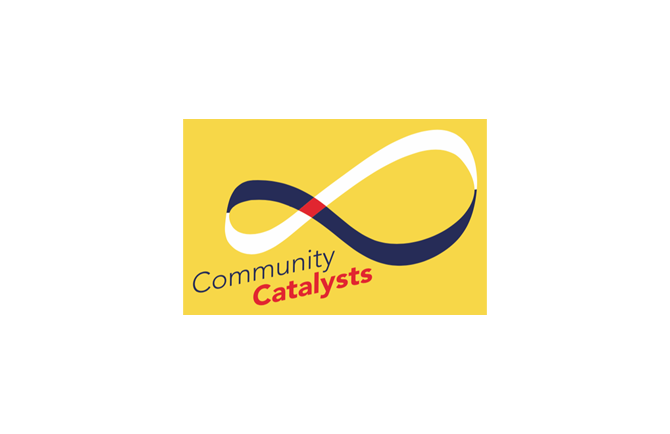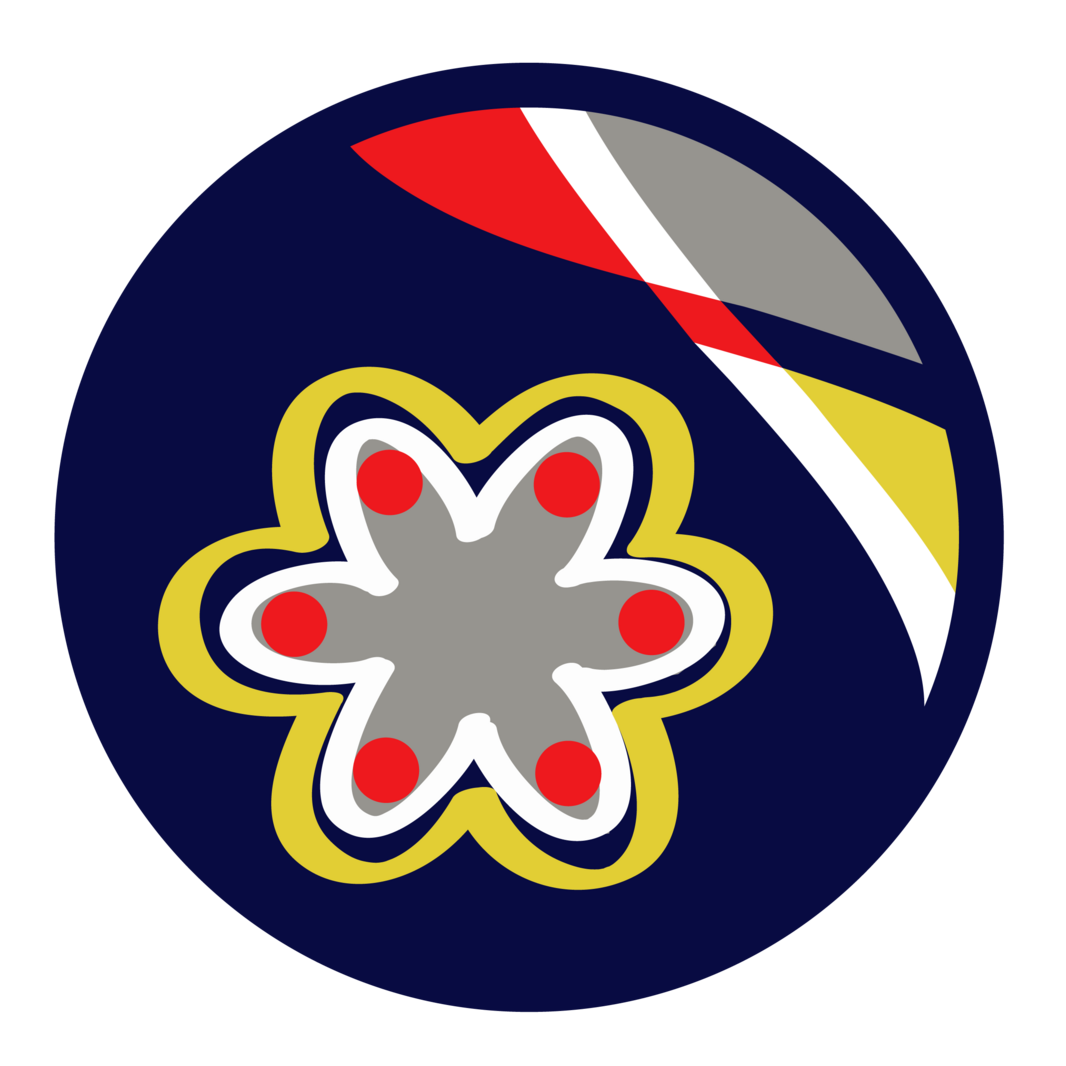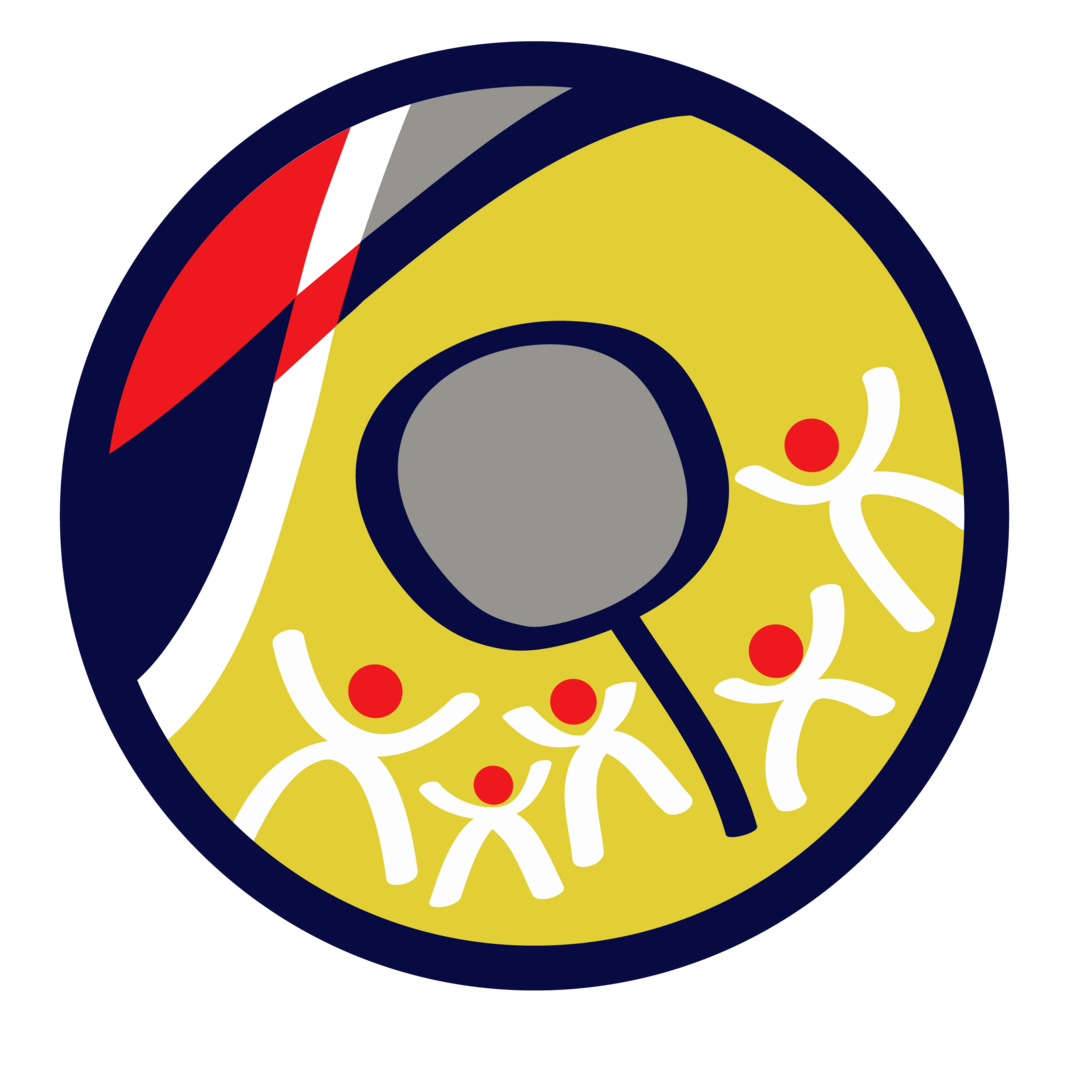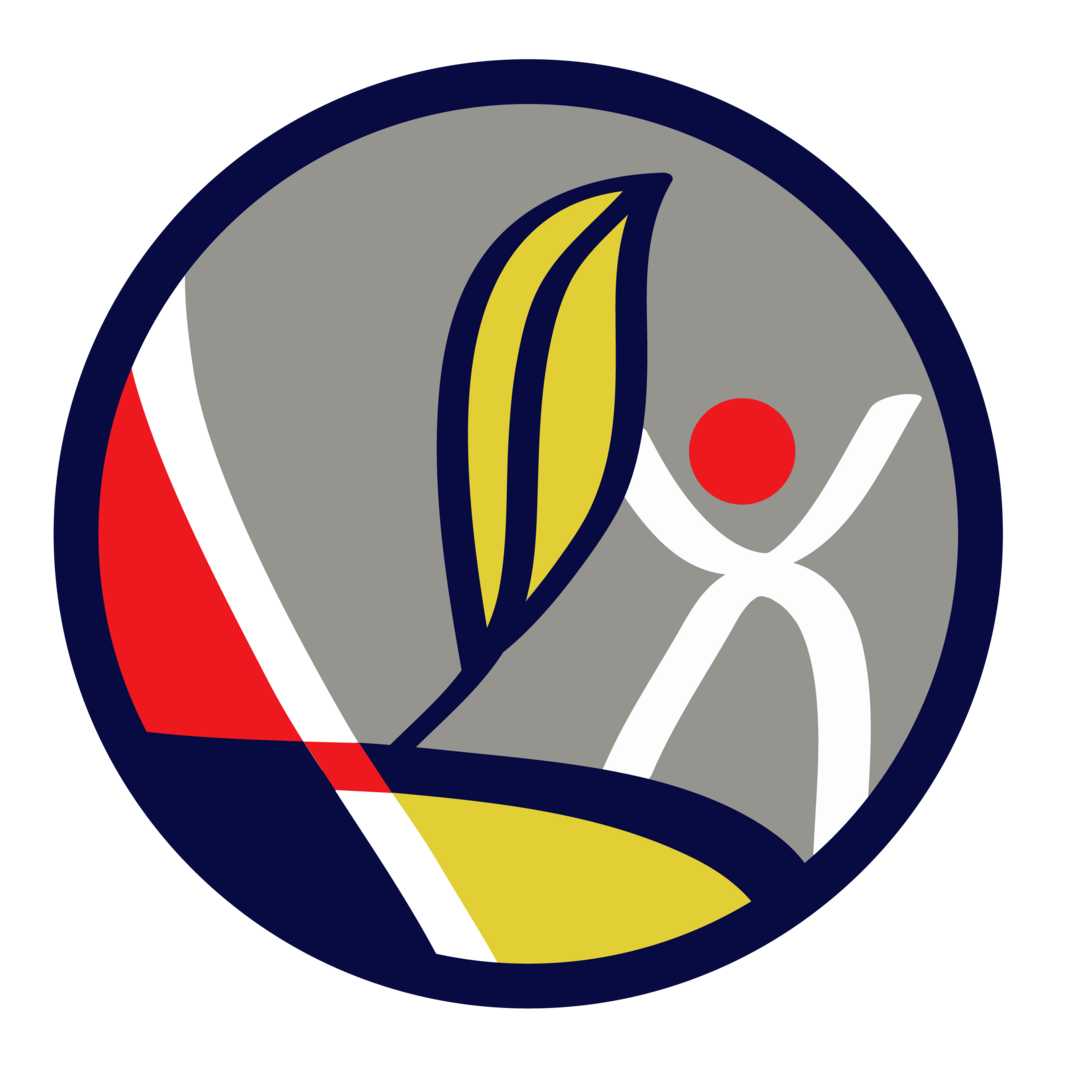WELCOME TO THE
TRANSFORMATIVE ECONOMIES CURRICULUM
Transformative Economies is an emerging umbrella term for all “proposals for socio-economic transformation that involve new ways of thinking and engaging in the economy. Based on a critical approach aimed at building a socio-economic system it places people, their communities and their environment at the center” (World Social Forum of Transformative Economies, 2020). Transformative Economies “create new economic relations between different life-forms and materials” and they “act to change resourcing and how resources are understood (care) or apportioned (justice)” (Ann Light, 2021).
Accordingly, Transformative Economies question the linear model of resource extraction to waste disposal and foster regenerative approaches instead concerned with the integrity and health of entire communities and ecosystems. Transformative Economies also cultivate a keen awareness of power relations, dignity and well-being hence they value reproductive care work, advance inclusive, participatory approaches, and set out to heal historical injustice and overcome contemporary inequality.
Several movements contribute relevant frameworks and practices, local initiatives and (inter)national networks to the scope of Transformative Economies. These movements include:
● Social, and Solidarity Economy
● Commons-based Economies
● Feminist Economics
● Agroecology and Food Sovereignty
● Degrowth and Postgrowth
● Community-based Economies (e.g. Community Wealth and Reconomy)
● Regenerative Economy
● Economy for the Common Good
● Wellbeing Economy
● Blue Economy
● Doughnut Economics
The first four of this list have been foregrounded by the World Social Forum for Transformative Economies and have most strongly inspired the development of this curriculum.
There are also important trends that are pervading and changing the existing economy, such as:
● Sharing and platform economy
● Circular economy
● Social innovation
● Social entrepreneurship
● Digitalisation (including free and open source software and hardware)
● Resilience and relocalisation of supply chains
● Responsible consumption
● Corporate social responsibility
It depends on how exactly and by whom these trends are shaped and enacted, whether they are reinforcing or even exacerbating the dominant economic operating system or whether they contribute to preparing the ground or amplifying Transformative Economies. Therefore, this curriculum aims to promote a critical appraisal of these trends.
WHO IS IT FOR?
This curriculum has been developed by and for changemakers who feel called to catalyse life-affirming socio-economic transformations in holistic ways at individual, organisational, community and bioregional levels.
It can be used in different ways, in different contexts, for various purposes:
● by individual learners or by groups;
● by self-learners and by trainers or group facilitators;
● in initiatives led by an informal group (or network), in a formal organisation (or
partnership of organisations), or a mix of these situations;
● for supporting the process of creating a new initiative, or for consolidating, reorienting
or boosting an existing initiative.
We use the term ‘initiative’ as a generic one to cover individuals, teams, projects, organisations, communities or networks that seek to catalyse socio-economic transformation.
WHAT IS IT ABOUT?
|
4 MODULES -> 1 DESIGN PROCESS -> 5 + 3 LEARNING PHASES -> MANY PRACTICES A TRANSFORMATIVE CURRICULUM |
This is a self-paced curriculum with several pathways to choose from depending on your curiosity and your current needs. You are invited to a learning journey that connects you to the potential of the place and community you belong. This journey supports you (and your collaborators) in raising awareness and deepening your understanding of approaches that help imagine, create or advance your initiative in the perspective of Transformative Economies. The curriculum has been deliberately designed for experiential learning, i.e. you will be prompted to engage in a collaborative design process made of a series of relevant practices and to reflect on the experiences you are having in the process.
The curriculum is composed of four modules. In each module you will go through one design process following the same five phases of inquiry plus three moments that support the opening and closing of each design process and going into deeper reflection about Transformative Economies concepts.
In each step, you’re invited to go through practices that will incrementally make sense and let emerge and manifest the potential of your unique place with its unique community.
FOUR DIMENSIONS FOUR MODULES
When developing a Transformative Economy initiative different poles of activity compete for our attention, resources and capacities. The key challenge is to strike the dynamic balance between two polarities:
★ taking care of what is going on inside your initiative and how it is enabling or limiting itself (“the way out is in”) while also being attentive to what is going on in the context in which your initiative is located and in which it intervenes (place and region, sector and domain, stakeholders and local community....);
★ establishing and cultivating as much as possible trustworthy, convivial and co-creative relationships, internally and externally (community dynamics), while also moving from ideas to implementation (actualisation dynamics).
From the four quadrants these axes define, four dimensions represent distinct aspects of the initiative’s development. They are complementary and help with the understanding of the initiative’s economics from different perspectives. The aim of these four dimensions framework is to support a systemic and integrative approach while allowing distinct aspects to be worked on one at a time, reinforcing the complementarity of distinct dimensions of initiatives’ transformation.
MODULE A - CARING PURPOSE
Focused on what brings an initiative to life: its purpose. A caring purpose takes into consideration the needs, potential and limits of its social and ecological context as much as the aspirations of the people that are contributing to the initiative.
MODULE B - SHARED CULTURE & GOVERNANCE
Focused on organisational culture, structure, governance and development. It touches upon power and participation, diversity and inclusion inside the initiative, on the processes for making decisions, coordinating work, distributing roles and allocating resources.
MODULE C - SYNERGISTIC PARTNERSHIPS
Focused on how to create and maintain longer-term partnerships with other transformative initiatives and with institutions that are mutually beneficial, that generate more desirable impact together than each of them alone, and that start constituting a transformation system imbued with collective intentionality.
MODULE D - ECO-SOCIAL ACTION
Focused on what the initiative is doing that is of value for its stakeholders and the wider common good. It explores different scales and types of action as well as their respective desired and undesired effects in terms of the ecological, biodiversity and social footprints.
